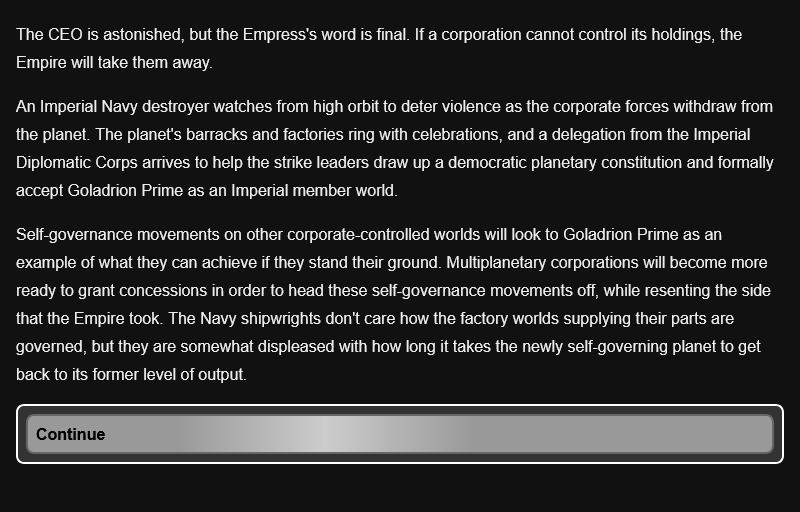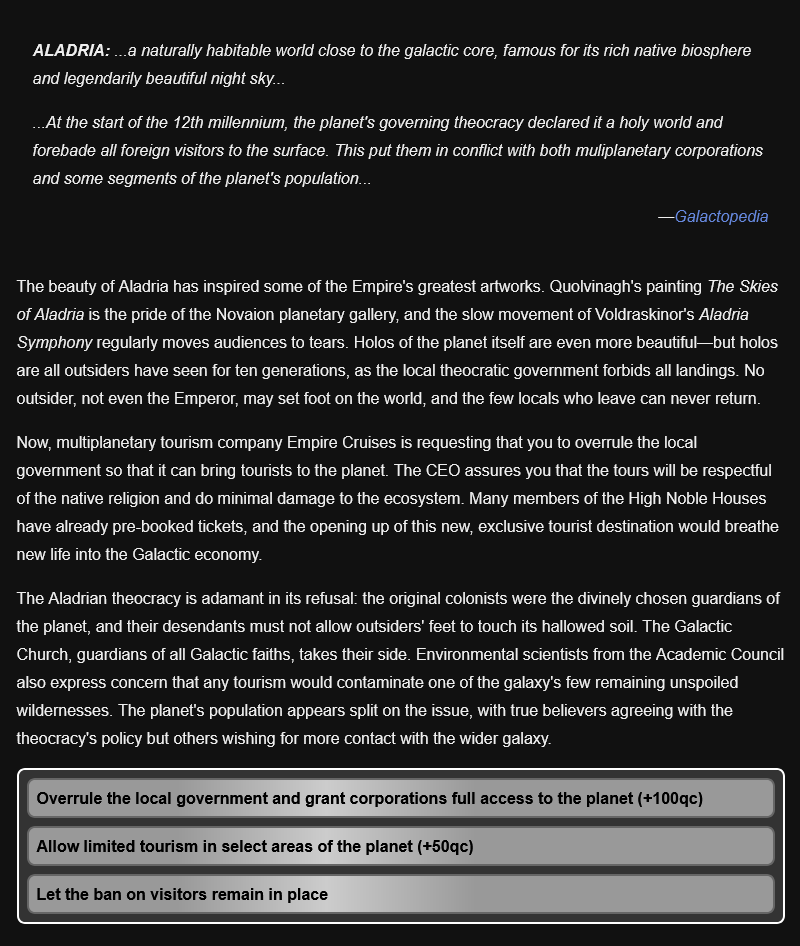Empire and Legacy will put you in charge of a declining Galactic Empire. But what empire, exactly?
There are various ways that galactic empires have been depicted in fiction, from the relatively benign one of Foundation, to the hotbed of feudal intrigues in Dune, to the fascist police state of Star Wars, to the over-the-top parody dystopia of Warhammer 40K. For Empire and Legacy, I’m positioning the Vaion Star Empire at the “relatively benign” end of the scale. It’s bad in the way that empires generally are bad, but it’s not especially bad on top of that. I want the player to feel attached to it and a little nostalgic when it ends, even if they end up with a galaxy that’s better off without it.
(Feeling a little nostalgic for an empire even though it was objectively terrible is perhaps a very British feeling. I’ve been getting myself in the mood to write this game by listening to Elgar.)
So, what is the Vaion Star Empire?
It rules with a light hand. Subject planets must obey Imperial authority but manage their own internal affairs and get to keep their local systems of government, which range from hereditary dictatorships to democracies. This means I can tell stories about planets with different kinds of governments, and conflicts between them that the Empire must mediate. I also think this light hand is why it could last ten thousand years, because individual planets don’t see Imperial rule as oppressive enough to bother throwing off.
It’s culturally diverse. There is a Vaionian ethnic group and culture, but the Empire actively celebrates the diversity of cultures among its subjects. At least, that’s the official line–unofficially, there’s probably a lot of cultural imperialism going on, which is something I’ll explore in events.
It keeps the peace. In the galactic history I’m constructing, the time before the Empire was characterised by interplanetary wars. The Empire was essentially the state that won these wars and kept growing until it controlled the whole galaxy. Some of the bad endings will involve this “Pax Imperia” collapsing and the galaxy descending into warfare again.
It’s capitalist. Subject planets have to allow imperial-chartered corporations to operate on their planets. In theory, this free trade benefits everyone. In practice, most of the benefits go to shareholders and consumers in the core worlds, while most of the poor working conditions and toxic waste dumping happens on the outlying sectors.
So, we have an empire that’s culturally loose, but economically integrated. It extracts wealth from the outlying regions for the benefit of the core, but it also keeps the peace across the entire galaxy and will step in to deal with problems that an individual planet might not be able to cope with.
*
The poll in last month’s dev blog, about an event where an industrial planet goes on strike, ended with a roughly even split between enforcing a compromise and ordering the corporation to cede control of the planet to the strikers. In the end the option to give the planet to the strikers won out. No one voted to send the Imperial Marines to put down the strike. It’s meant to be the evil option, so I guess no one wanted to roleplay as a capitalist space tyrant!
Anyway, this is the result you’ll get if you pick that option in the game:

The CEO is astonished, but the Empress’s word is final. If a corporation cannot control its holdings, the Empire will take them away.
An Imperial Navy destroyer watches from high orbit to deter violence as the corporate forces withdraw from the planet. The planet’s barracks and factories ring with celebrations, and a delegation from the Imperial Diplomatic Corps arrives to help the strike leaders draw up a democratic planetary constitution and formally accept Goladrion Prime as an Imperial member world.
Self-governance movements on other corporate-controlled worlds will look to Goladrion Prime as an example of what they can achieve if they stand their ground. Multiplanetary corporations will become more ready to grant concessions in order to head these self-governance movements off, while resenting the side that the Empire took. The Navy shipwrights don’t care how the factory worlds supplying their parts are governed, but they are somewhat displeased with how long it takes the newly self-governing planet to get back to its former level of output.
For this month’s poll, here’s another event. Will you allow tourism on a holy world?

ALADRIA: …a naturally habitable world close to the galactic core, famous for its rich native biosphere and legendarily beautiful night sky…
…At the start of the 12th millennium, the planet’s governing theocracy declared it a holy world and forebade all foreign visitors to the surface. This put them in conflict with both muliplanetary corporations and some segments of the planet’s population…
—Galactopedia
The beauty of Aladria has inspired some of the Empire’s greatest artworks. Quolvinagh’s painting The Skies of Aladria is the pride of the Novaion planetary gallery, and the slow movement of Voldraskinor’s Aladria Symphony regularly moves audiences to tears. Holos of the planet itself are even more beautiful—but holos are all outsiders have seen for ten generations, as the local theocratic government forbids all landings. No outsider, not even the Emperor, may set foot on the world, and the few locals who leave can never return.
Now, multiplanetary tourism company Empire Cruises is requesting that you to overrule the local government so that it can bring tourists to the planet. The CEO assures you that the tours will be respectful of the native religion and do minimal damage to the ecosystem. Many members of the High Noble Houses have already pre-booked tickets, and the opening up of this new, exclusive tourist destination would breathe new life into the Galactic economy.
The Aladrian theocracy is adamant in its refusal: the original colonists were the divinely chosen guardians of the planet, and their desendants must not allow outsiders’ feet to touch its hallowed soil. The Galactic Church, guardians of all Galactic faiths, takes their side. Environmental scientists from the Academic Council also express concern that any tourism would contaminate one of the galaxy’s few remaining unspoiled wildernesses. The planet’s population appears split on the issue, with true believers agreeing with the theocracy’s policy but others wishing for more contact with the wider galaxy.
> Overrule the local government and grant corporations full access to the planet (+100qc)
> Allow limited tourism in select areas of the planet (+50qc)
> Let the ban on visitors remain in place
The (+100qc) note after some of the options refers to the amount of money you’ll make for the Imperial treasury when you pick that option (q.c. = “quadrillion credits”). I’m adding an Imperial Treasury stat, which you’ll have to spend on public works projects, and if you run out you’ll have to raise taxes and/or cut spending which will annoy one of the factions. So, in the game, you might find yourself picking “bad” options just to raise money you’ll need to pick “good” options later.
Overrule the local government and grant corporations full access to the planet (+100qc) 7%
Allow limited tourism in select areas of the planet (+50qc) 64%
Let the ban on visitors remain in place 29%
